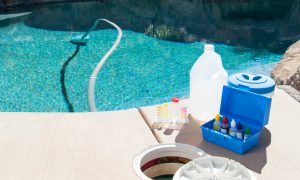 Understand your pool chemicals for a beautiful pool
Understand your pool chemicals for a beautiful pool
Getting to know your basic pool chemicals and water parameters for your swimming pools is important to have beautiful pool water. A quick read through the following list of chemicals and water measurements can go a long way this season when it comes to knowing how to keep your pool water safe, comfortable, and clear.
Chlorine: Chlorine products come in many different varieties, all of which help to sanitize your pool water by killing bacteria, keeping your pool water clear and safe. Your “free chlorine” refers to the level of active, sanitizing chlorine in your water, while “total chlorine” refers to the total level of chloramines (compounds made up partially of the element chlorine). Your free and total chlorine levels should ideally be the same number, and between 1 and 4 ppm. Other sanitizers include bromine, which when added acts similarly to chlorine.
pH: pH is the level of acid and base in your water, the lower the pH, the more acidic your water, and the higher your pH, the more basic. Your pool should be around 7.5. If pH in pool water is too high, you risk scaling deposits and cloudy water. If its too low, you risk scaling and corrosion of your pools surface and equipment.
Total Alkalinity: The amount of acid “buffers” in your water refers to the level of total alkalinity, which when in a proper range prevents your pools pH from fluctuating too high or too low. Your pool’s total alkalinity should be in the range of 120-150 ppm (parts per million).
Calcium Hardness: Calcium Hardness refers to the level of dissolved calcium in your pool water. When calcium levels are too low, plaster surfaces become rough and can crack, and vinyl liners will deteriorate more quickly. For plaster surfaces, keep you calcium hardness levels between 200-250 ppm, and for vinyl liners pools, between 175-225 ppm.
Metals: Metals such as iron, copper, and manganese should not be present in your pool. If present, your pool may undergo staining and change in water color. If a water test determines your pool is high in metals, consult with on of our water analysts about adding a metal and scale remover to your pool.
Cyanuric Acid: Cyanuric acid acts as a chlorine “stabilizer” and can protect the chlorine in your pool from sun light degradation. Many chlorine products are manufactured with stabilizing cyanuric acid, so its important to test for cyanuric acid so that your stabilizer levels to not get to high, which can result in making your chlorine ineffective, or even in purple crystal deposits on your pool’s surface.
Algaecides: Keeping algae out of your water is key to having a safe and enjoyable pool. Algae comes in many different varieties and colors, even blue, black and pink! Adding algaecide after treating your pool with chlorine shock should be part of your sanitization program, ask us about the best maintenance algaecide for your pool today to keep your water clean all year long.
Remember, our free water tests are available during our open store hours. Bring in small sample of water (at least 6 ounces), and we’ll give you incredibly accurate results for every important chemical parameter in your pool. As always, if you have any chemical questions at all, stop in or give us a call at (860) 673-6118.
You can schedule your pool opening with us over the phone: (860) 673-6118 or schedule online with your preferred open date.


